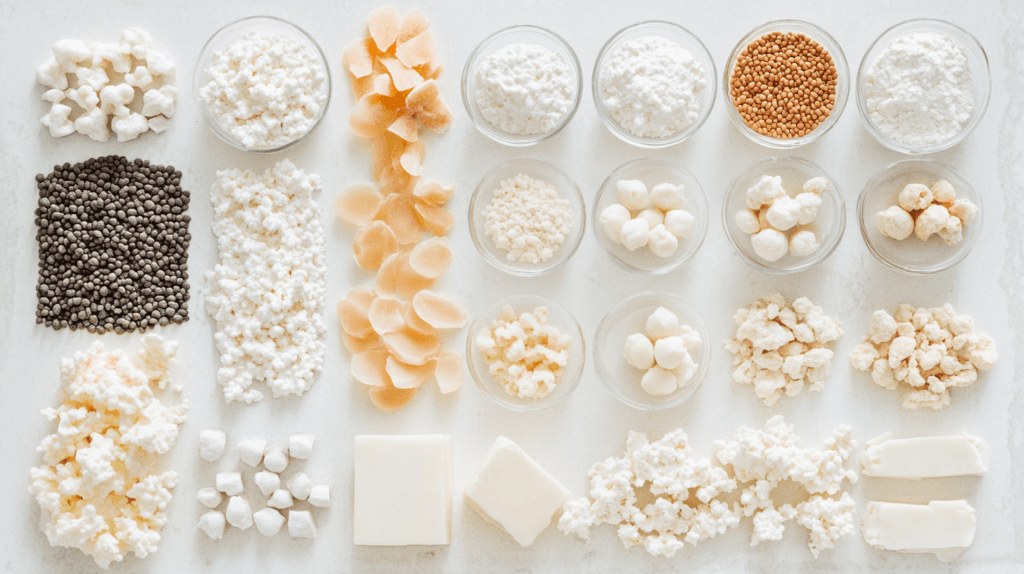Introduction
Cottage cheese is a versatile and highly nutritious food that has steadily gained popularity among health-conscious individuals and fitness enthusiasts alike. Moreover, its creamy texture, mild flavor, and impressive nutritional profile make it a staple in a wide variety of diets. Additionally, it can be easily incorporated into meals and snacks, catering to diverse dietary preferences.But one question often arises: How much cottage cheese should you eat daily?
The answer isn’t straightforward, as it depends on various factors, such as your age, lifestyle, dietary needs, and health goals. In this article, we’ll break down everything you need to know about incorporating cottage cheese into your diet, including its nutritional benefits, ideal portion sizes, and ways to enjoy it.
Cottage cheese is more than just a tasty snack—it’s packed with nutrients that can contribute to muscle growth, weight management, and bone health. However, eating the right amount is key to ensuring you reap the benefits without overindulging. Let’s dive in!
Nutritional Overview of Cottage Cheese

Cottage cheese is often celebrated for its impressive nutrient profile. Not only is it a low-calorie, high-protein option, but it also contains a variety of essential vitamins and minerals that support overall health. When you understand the nutritional breakdown of cottage cheese, you can better appreciate why it’s a dietary favorite and why many choose to eat it regularly.
Macronutrients in Cottage Cheese
- Protein Powerhouse
Cottage cheese is an excellent source of protein, particularly casein, a slow-digesting protein that promotes muscle repair and growth.- A typical ½-cup serving contains 12–15 grams of protein.
- This makes it ideal for athletes, fitness enthusiasts, or anyone aiming to increase their protein intake.
- Carbohydrate Content
Cottage cheese is low in carbohydrates, with about 3–4 grams per serving. This makes it suitable for low-carb or ketogenic diets.- Its minimal sugar content adds to its appeal for those looking to manage blood sugar levels.
- Varying Fat Levels
The fat content in cottage cheese depends on the variety:- Fat-Free: Contains less than 0.5 grams of fat per serving.
- Low-Fat: Typically has 1–2 grams of fat per serving.
- Full-Fat: Contains 4–5 grams of fat per serving, offering more satiety and richness.
Micronutrients: Vitamins and Minerals
Cottage cheese isn’t just about macronutrients; it also provides a range of essential vitamins and minerals:
- Calcium: Vital for maintaining bone strength and dental health. A serving provides about 125 milligrams, contributing to your daily requirement.
- Vitamin B12: Essential for red blood cell production and neurological health, with one serving meeting about 20% of your daily needs.
- Phosphorus: Works with calcium to strengthen bones and teeth.
- Selenium: A powerful antioxidant that supports the immune system and thyroid function.
Low in Calories, High in Nutrients
One of the best things about cottage cheese is its exceptional nutrient density. In addition, a ½-cup serving typically contains only 100–120 calories, which makes it an excellent choice for individuals managing their caloric intake. Furthermore, it provides essential nutrients without compromising on taste or nutritional value, making it a smart addition to a balanced diet.
Health Benefits of Cottage Cheese
Cottage cheese is more than just a protein-packed snack—its rich nutritional profile provides a variety of health benefits that enhance overall well-being. When you eat cottage cheese regularly, it can contribute significantly to muscle health, support better digestion, strengthen bones, and assist with effective weight management. Let’s delve deeper into how this creamy delight achieves these benefits.
Benefits for Muscle Growth
Cottage cheese is a top choice for athletes and fitness enthusiasts because of its high-quality protein content.
- Rich in Casein Protein: Casein is a slow-digesting protein that provides a steady release of amino acids over time, which is especially beneficial for muscle repair and growth.
- Post-Workout Recovery: Consuming cottage cheese after a workout can help replenish muscles and improve recovery. Pair it with a fast-digesting carbohydrate for optimal results.
Digestive Health and Cottage Cheese
Certain varieties of cottage cheese, particularly those containing live probiotics, can support gut health.
- Probiotic Benefits: Probiotic-rich cottage cheese enhances the balance of good bacteria in your digestive system, improving gut function and overall digestion.
- Easily Digestible: Even for those without probiotics, the soft curds of cottage cheese are gentle on the stomach, making it suitable for people with mild digestive issues.
Supporting Bone Health
Cottage cheese is a rich source of calcium and phosphorus, two minerals essential for maintaining strong bones and teeth.
- Calcium for Bone Density: Regular consumption can reduce the risk of osteoporosis, especially in older adults.
- Phosphorus Synergy: Phosphorus works alongside calcium to enhance bone health and support cellular repair.
Weight Management with Cottage Cheese
For those aiming to lose or maintain weight, cottage cheese is a fantastic dietary addition:
- Low in Calories: A serving of cottage cheese provides satiety without excessive calories.
- High in Protein: Protein increases feelings of fullness, helping to reduce overall calorie intake throughout the day.
- Versatility: Whether you’re snacking, cooking, or using it in desserts, cottage cheese fits seamlessly into many calorie-controlled meals.
Cottage cheese doesn’t just nourish the body—it supports active lifestyles, healthy aging, and even digestive harmony. With so many benefits, it’s no wonder it’s a go-to choice for people of all ages.
Factors Affecting How Much Cottage Cheese to Eat Daily
Determining the ideal amount of cottage cheese to eat each day depends on several personal factors, including age, gender, activity level, and overall dietary needs. By taking these variables into account, you can tailor your cottage cheese intake to align perfectly with your health goals and lifestyle.
Age and Gender Considerations
- Adults:
For adults, a serving size of ½ to 1 cup (4–8 ounces) of cottage cheese per day is generally recommended.- This portion provides adequate protein, calcium, and other nutrients without exceeding daily caloric needs.
- Women may benefit from including cottage cheese for its calcium content to support bone health, particularly post-menopause.
- Children:
For children, the recommended portion is smaller, around ¼ to ½ cup per day.- Cottage cheese serves as a protein-rich addition to their meals or snacks, supporting growth and development.
- Ensure the variety chosen is low in sodium to suit their dietary requirements.
- Older Adults:
Cottage cheese is an excellent food for older adults, offering a soft texture, high protein content, and calcium to support muscle retention and bone density. Aim for ½ cup per day or adjust based on dietary restrictions.
Activity Level and Fitness Goals
Your level of physical activity and fitness objectives play a significant role in determining how much cottage cheese to consume:
- Sedentary Individuals: A ½-cup serving is sufficient for those with minimal physical activity, as it provides essential nutrients without excessive calories.
- Active Individuals and Athletes: Higher protein needs due to intense workouts may justify consuming up to 1½ cups daily, spread across meals and snacks.
- Weight Loss Goals: A ½-cup portion works well as a low-calorie, high-protein snack to curb hunger and promote fat loss.
Dietary Restrictions and Allergies
- Lactose Intolerance:
- While cottage cheese contains less lactose than milk, those with lactose intolerance may experience discomfort.
- Opt for lactose-free cottage cheese or plant-based alternatives.
- Sodium Sensitivity:
- Cottage cheese can be high in sodium, which may not be suitable for individuals with high blood pressure.
- Look for low-sodium varieties to reduce salt intake without sacrificing nutrition.
- Vegan Diets:
- Vegans can choose dairy-free cottage cheese made from almond or soy milk as an alternative to traditional cottage cheese.
Understanding these factors allows you to adjust your cottage cheese intake for optimal health benefits, tailored specifically to your unique dietary needs and goals.
Ideal Portion Sizes of Cottage Cheese
Understanding the appropriate portion size of cottage cheese is essential to eating it effectively as part of your diet without overconsuming calories or nutrients. These portion recommendations can vary based on factors such as your dietary needs, age, and overall lifestyle.
Recommended Daily Amount for Adults
For most adults, the recommended daily portion of cottage cheese is ½ to 1 cup (approximately 4 to 8 ounces).
- Protein Intake: This serving provides 12–28 grams of protein, which contributes to meeting the daily protein requirement of 46–56 grams for most adults.
- Calorie Control: A ½-cup serving contains roughly 100–120 calories, depending on the fat content, making it an excellent option for a calorie-controlled diet.
- Sodium Awareness: Adults should be mindful of sodium levels, as some varieties of cottage cheese contain up to 400 milligrams per serving. Low-sodium options are preferable for those monitoring salt intake.
Cottage Cheese Recommendations for Children
Children can enjoy cottage cheese as a nutrient-rich addition to their meals or snacks. The portion size should be smaller, typically around ¼ to ½ cup (2 to 4 ounces) per day.
- Protein for Growth: A ¼-cup serving provides approximately 6–7 grams of protein, supporting healthy growth and muscle development.
- Low-Sodium Options: For younger children, opt for unsalted or low-sodium varieties to avoid exceeding their recommended daily sodium intake.
- Snack Ideas: Pair cottage cheese with fruits, such as peaches or berries, to create a kid-friendly, balanced snack.
Portion Adjustments Based on Goals
- For Weight Management:
- Stick to a ½-cup portion as a snack or meal addition.
- Combine with high-fiber foods like vegetables to enhance fullness and aid in calorie control.
- For Muscle Building:
- Consider increasing your portion size to 1–1½ cups per day, spread across meals or snacks, to meet higher protein requirements.
- For Bone Health:
- Pair a ½-cup serving of cottage cheese with other calcium-rich foods, like leafy greens or fortified plant-based milk, to optimize calcium intake.
By adhering to these portion size guidelines, you can ensure that cottage cheese effectively supports your health goals without exceeding your nutritional needs. For kids, a portion size of ¼ to ½ cup works particularly well, as it provides essential calcium, protein, and vitamins. Additionally, it helps meet their nutritional requirements without surpassing their energy needs, making it a balanced and healthy choice.
Balancing Cottage Cheese in Your Diet
Cottage cheese can be a wonderful addition to a balanced diet, but like any food, it’s essential to incorporate it thoughtfully. When you eat cottage cheese in the right amounts, you can fully enjoy its health benefits while minimizing any potential downsides. Striking this balance is key to making it a valuable part of your nutrition plan.
Combining Cottage Cheese with Other Foods
To make cottage cheese more versatile and enjoyable, pair it with complementary foods that enhance its nutritional value.
- Fruits for a Sweet Pairing:
Cottage cheese pairs beautifully with sweet fruits, creating a nutritious snack or dessert.- Top Picks: Pineapple, strawberries, blueberries, and peaches.
- Benefits: The natural sweetness of fruits adds flavor while contributing vitamins, antioxidants, and fiber.
- Vegetables for a Savory Option:
For a savory twist, mix cottage cheese with fresh or roasted vegetables.- Top Picks: Cucumbers, cherry tomatoes, bell peppers, and carrots.
- Benefits: Adds crunch and enhances your intake of vitamins A and C.
- Whole Grains for a Balanced Meal:
Combine cottage cheese with whole grains for a well-rounded meal or snack.- Ideas: Spread it on whole-grain toast, mix it with quinoa or brown rice, or use it as a topping for crackers.
- Benefits: Balances the protein and fat in cottage cheese with complex carbohydrates for sustained energy.
Potential Risks of Overconsumption
While cottage cheese is nutrient-rich, overindulging can lead to certain risks:
- High Sodium Intake:
Many store-bought varieties of cottage cheese are high in sodium, which can contribute to:- Increased blood pressure in sodium-sensitive individuals.
- Fluid retention and bloating.
- Caloric Overload:
Although cottage cheese is relatively low in calories, consuming it in large quantities—especially full-fat varieties—can add up.- Example: 1½ cups of full-fat cottage cheese contains approximately 300 calories, which can interfere with calorie-controlled diets.
- Lactose Intolerance:
Some individuals may experience digestive discomfort, such as bloating or diarrhea, due to lactose in cottage cheese.- Alternative: Choose lactose-free options to enjoy the same benefits without the side effects.
By combining cottage cheese with nutrient-rich foods and staying mindful of portion sizes, you can incorporate it into your diet in a way that supports your health and taste preferences.
Cottage Cheese and Popular Diets

Cottage Cheese in Low-Carb Diets
It is a staple in low-carb and ketogenic diets due to its low carbohydrate content and high protein levels. A serving fits well within the daily carb limits of these diets.
How Cottage Cheese Fits into a High-Protein Diet
For individuals following a high-protein diet, cottage cheese serves as a convenient, versatile source of protein. It can be eaten as a standalone snack or incorporated into meals throughout the day.
Role of Cottage Cheese in Vegetarian Diets
As a rich source of protein and calcium, cottage cheese is an excellent addition to vegetarian diets. It helps fill the nutritional gaps often associated with meatless eating plans.
How to Incorporate Cottage Cheese Into Your Meals
Breakfast Ideas with Cottage Cheese
- Cottage Cheese Parfait: Layer it with granola, fresh fruit, and a drizzle of honey for a protein-packed breakfast.
- Savory Toast: Spread cottage cheese on whole-grain toast and top with sliced avocado or tomatoes.
Creative Snacks Featuring Cottage Cheese
- Dip: Blend it with herbs and spices to make a healthy dip for veggies or crackers.
- Stuffed Veggies: Use cottage cheese as a filling for bell peppers or zucchini.
Dinner Recipes Using Cottage Cheese
- Lasagna: Substitute ricotta with cottage cheese for a lighter twist on this classic dish.
- Baked Potatoes: Add cottage cheese as a creamy, protein-rich topping for baked potatoes.
Cottage Cheese Alternatives
Low-Fat vs. Full-Fat Cottage Cheese
When choosing between low-fat and full-fat cottage cheese, the decision often depends on dietary preferences and health goals:
- Low-Fat Cottage Cheese: Lower in calories and fat, making it ideal for those watching their weight or cholesterol levels.
- Full-Fat Cottage Cheese: Contains more fat, which enhances flavor and provides longer-lasting satiety. It can be a better option for individuals on a low-carb, high-fat diet.
Vegan and Dairy-Free Options
For individuals avoiding dairy, there are several alternatives:
- Plant-Based Cottage Cheese: Made from nuts or soy, these options mimic the texture and flavor of traditional cottage cheese.
- Tofu-Based Alternatives: Crumbled tofu mixed with nutritional yeast and spices can serve as a high-protein, dairy-free substitute.
Frequently Asked Questions About Cottage Cheese
Can You Eat Cottage Cheese Every Day?
Yes, you can eat cottage cheese daily as part of a balanced diet. Its nutrient-rich profile supports muscle health, bone density, and overall well-being. However, ensure you’re not exceeding your daily caloric or sodium limits by monitoring portion sizes and choosing low-sodium varieties.
Is Cottage Cheese Good Before Bed?
Absolutely! Cottage cheese is an excellent bedtime snack due to its high casein protein content. This slow-digesting protein helps repair muscles and sustains energy levels throughout the night.
Does Cottage Cheese Help with Weight Loss?
Yes, cottage cheese can aid in weight loss. Its high protein content promotes satiety, reducing hunger and curbing overeating. For a lighter option, choose low-fat cottage cheese varieties that keep your calorie intake in check.
How Long Does Cottage Cheese Stay Fresh?
Cottage cheese typically stays fresh for 7–10 days after opening if refrigerated. To ensure its freshness, store it in an airtight container and always check the expiration date. Explore tips for proper food storage to extend the shelf life of your ingredients.
Conclusion
Cottage cheese is a versatile and nutrient-packed food that complements a healthy lifestyle. Whether you’re enjoying it to lose weight, build muscle, or as a delicious snack, it offers numerous benefits. By understanding portion sizes and integrating it into meals creatively, like in these simple recipes, you can make the most of this wholesome ingredient.

